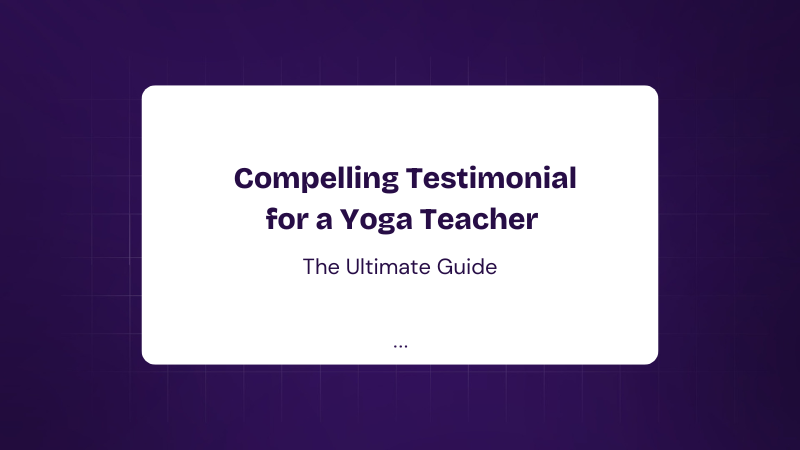The Art of Singing Praises Without Sounding Like a Paid Ad
So, you’ve found a yoga teacher who has transformed your life—your stress levels have dropped, your downward dog actually looks like a downward dog, and you no longer mistake savasana for an afternoon nap. Now, they’ve asked you for a testimonial. Easy, right?
Except, the moment you sit down to write it, your mind goes blank. Do you keep it simple? Do you get poetic? Do you throw in a Sanskrit word or two to sound legit?
Writing a testimonial is like writing a love letter to someone who’s helped you grow—only instead of gushing over their eyes, you’re talking about their ability to help you touch your toes. Let’s break down how to craft a testimonial that’s both heartfelt and effective.
Why a Testimonial for a Yoga Teacher Matters
Before we dive into the “how,” let’s talk about the “why.” Testimonials are powerful. They:
✔️ Help new students trust the teacher before even stepping onto the mat.
✔️ Provide real-life proof that the teacher is as good as their website claims.
✔️ Show appreciation for the teacher’s hard work (because let’s be honest, they probably hear more groans than compliments in class).
A well-written testimonial isn’t just for the teacher—it’s for the future students who are still on the fence about trying their first class.
Elements of a Powerful Yoga Testimonial
A great testimonial isn’t just about saying, “They’re amazing!” (although, if they are, that’s a great start). It should have:
1. A Personal Touch
Share a bit about your experience before yoga. Were you inflexible? Stressed? Convinced that yoga was just stretching? Giving a before-and-after glimpse makes the testimonial more relatable.
✅ Example:
“Before taking classes with [Teacher’s Name], I thought yoga was just for super-flexible people. I couldn’t even touch my toes, and my idea of relaxation was binge-watching TV. But from the first class, their warmth and patience made me feel at ease.”
2. Specific Results or Benefits
What changed for you? Did you become physically stronger? Sleep better? Find mental clarity?
✅ Example:
“After a few months, I noticed a huge difference—not just in my flexibility, but in my mindset. My anxiety decreased, my posture improved, and I actually started looking forward to my mornings (which, trust me, was unheard of before).”
3. A Mention of Their Teaching Style
Every yoga teacher has a unique way of guiding students. Are they nurturing? Challenging? Funny?
✅ Example:
“What I love most about [Teacher’s Name] is their ability to make each class feel special. They balance mindfulness with humor, making even the hardest poses feel achievable. Their adjustments are gentle, their cues are clear, and their playlists? Absolute perfection.”
4. A Strong Closing Line
Wrap it up with a powerful statement of recommendation.
✅ Example:
“If you’re looking for a yoga teacher who truly cares about your growth—physically and mentally—look no further than [Teacher’s Name]. It’s not just yoga; it’s a life-changing experience.”
Example: A Well-Written Yoga Testimonial
*”I used to believe that yoga wasn’t for me. My body was stiff, my mind was restless, and I thought meditation was just an excuse to nap. But then I found [Teacher’s Name]. Their classes were a game-changer. They created a space where I felt safe, encouraged, and—dare I say—excited to practice.
Through their guidance, I not only gained flexibility but also learned how to slow down and be present. Their approach is the perfect blend of challenge and support, always pushing me just enough to grow without feeling overwhelmed.
Thanks to [Teacher’s Name], yoga has become a part of my daily life, and I can’t recommend them enough to anyone looking to start their own journey.”*
FAQs
How long should a yoga testimonial be?
Ideally, keep it between 100-250 words. Long enough to feel genuine but short enough to keep attention.
Should I be formal or personal?
A conversational tone often works best—it makes your words feel more authentic.
Do I need to mention specific poses or yoga styles?
Only if it feels relevant! If their vinyasa flow class changed your life, mention it. But if it’s more about their energy and teaching style, focus on that.
Can I write a testimonial if I’m still a beginner?
Absolutely! In fact, beginner testimonials can be incredibly powerful because they help encourage others who are just starting.
Where will my testimonial be used?
Usually on the teacher’s website, social media, or marketing materials. If you’re not comfortable with your full name being shared, let them know!
Final Thoughts: Share from the Heart
Writing a testimonial isn’t about sounding fancy—it’s about being real. Think of what you’d say if someone asked, “Why do you love this teacher?” and write that down.
Now, go on, spread some love for your yoga teacher! They’ve helped you, and now it’s your turn to give back with words that might just inspire someone else to step onto the mat.



